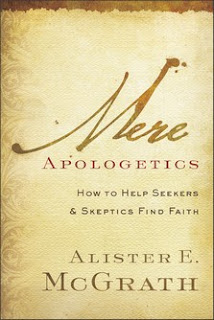AUTHOR: Alister E. McGrath
PUBLISHER: Grand Rapids, MI: Baker Books, 2012, (208 pages).
Ever since CS Lewis's classic work of apologetics, 'Mere Christianity,' there has been a slew of books that uses the 'mere' word in explaining the basics of a certain subject. There is 'Mere Discipleship' by Lee Camp, 'Mere Morality' by Lewis Smedes, and 'Mere theology' by Will Vaus. Most of these books will in some way make some reference back to the great Oxford don and oft-quoted Christian thinker-philosopher. Mere Apologetics is no different. Based on his work on Apologetics both at Oxford and at Regent College, McGrath gives the Christian public a glimpse of his teaching framework that he has used.
McGrath begins his book with some acknowledgement of CS Lewis's influence on him. Like a good teacher aiming to bring even the slowest student up to speed, McGrath defines some basic terms clearly. He talks about what Apologetics is. He makes a difference between 'evangelism' and 'apologetics,' in that the former moves towards commitment while the latter makes commendations for the faith. For McGrath, apologetics basically comprises of three themes: 1) Defending the Faith without being personally defensive; 2) Commending the faith to illuminate its beauty and truth; 3) translating the beliefs into a manner that is comprehensible. The approach McGrath adopts is through 6-steps.
- Understand the faith;
- Understand the Audience
- Clear communications
- Identify points of contact with the audience
- Present the whole gospel
- Continual practice.
McGrath takes the time to present the theological basis of Apologetics, the various contexts that Paul faced during the New Testament times to the Jews, Greeks, and Romans. He proves that Christianity is a very reasonable faith. When engaging an audience, he shows readers 8 clues that can be used to point to a Creator God. He highlights various 'gateways' to open the door to faith: Gateways of explanation, of argument, of stories,and of images. Finally, McGrath tackles some tough questions like suffering, and the criticism of God being used as a crutch for weak minded people. Occasionally, McGrath will drop a hint or two on the incredulous nature of the arguments used by world-renowned atheists like Richard Dawkins.
Closing Thoughts
This book is a good primer to use for any student of Apologetics. It is so clearly framed that anyone new will be able to hang on to the reasoning and relatively complex arguments used. McGrath makes the explanation so simple that one may think it is too easy. Truth is, the contents are serious and deal with hard material. So much so that I feel some of the most important things in Apologetics is not the content or information to say, but the way we say it. I appreciate the basic points McGrath makes with regards to being gracious, objective, be relevant, and be humble. Each chapter has a section to point readers forward to deeper research. Thus, there is something for everybody. For readers new to Apologetics, this book can be used as primer material. For those who are more advanced, this book points to many other helpful resources to build up our learning and our confidence to do apologetics.
Clearly written with wise advice, this book deserves to be on the bookshelves of teachers, pastors, leaders, and anyone interesting in learning how to defend the faith, and to be prepared to give anybody an answer for the hope that Christians have. McGrath is tough on critics but does so in a very respectful way. He has not only taught us how to do Apologetics, he has shown us what manner as well. This book has again showed us how McGrath is able to bridge scholarship, cultural contexts, and engagement techniques with the laypersons in mind.
Ratings: 5 stars of 5.
conrade
"Book has been provided courtesy of Baker Publishing Group and Graf-Martin Communications, Inc. Available at your favourite bookseller from Baker Books, a division of Baker Publishing Group".

No comments:
Post a Comment